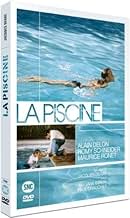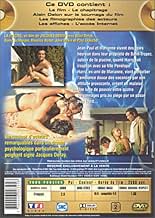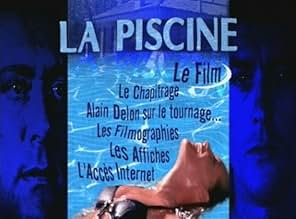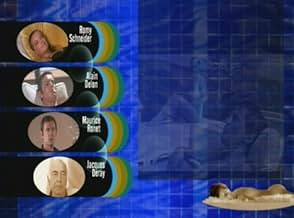La piscine
- 1969
- Tous publics
- 2h 2m
Jean-Paul and Marianne spend lazy holidays at their villa in idyllic Southern France. However when Harry and his attractive young daughter Penelope show up, the dreamy summer days are sudden... Read allJean-Paul and Marianne spend lazy holidays at their villa in idyllic Southern France. However when Harry and his attractive young daughter Penelope show up, the dreamy summer days are suddenly filled with unspoken tension and jealousy.Jean-Paul and Marianne spend lazy holidays at their villa in idyllic Southern France. However when Harry and his attractive young daughter Penelope show up, the dreamy summer days are suddenly filled with unspoken tension and jealousy.
- Director
- Writers
- Stars
Maddly Bamy
- La mulâtre qui danse
- (as Madlybamy)
Steve Eckardt
- Fred
- (as Steve Eckart)
Stéphanie Fugain
- Une amie à la party
- (uncredited)
- Director
- Writers
- All cast & crew
- Production, box office & more at IMDbPro
Featured reviews
I saw it few times with the nostalgia of the great first scenes. A film about love, hate, jealousy, games and death . Admirable work of Romy Schneider and Alain Delon and great craft of the nuances of story. And, sure, a young Jane Birkin , seductive and well acting.
Maybe, the remarkable good point remains the dialogue and the ambiguous games of characters. Sure, a classic , with its obvious virtuous but, more important, with few sins who, after a half of century are very near to the status of virtues.
A good cast and a fairs slice of thriller. And the summer proper reflected in the water of pool.
The most simple is to say : see it ! Not for story but for emotions inspired by a fist of scenes.
Maybe, the remarkable good point remains the dialogue and the ambiguous games of characters. Sure, a classic , with its obvious virtuous but, more important, with few sins who, after a half of century are very near to the status of virtues.
A good cast and a fairs slice of thriller. And the summer proper reflected in the water of pool.
The most simple is to say : see it ! Not for story but for emotions inspired by a fist of scenes.
And what eye candy - Alain Delon.
"La Piscine" is about two impossibly beautiful people in various stages of undress having a lot of foreplay. Or so it seems. Jean- Paul (Delon) and his lover (or wife, not sure) Marianne (Romy Schneider) are vacationing in a friend's mansion in Saint-Tropez. Lots of sun, making out, and swimming.
Marianne's ex-beau, Harry (Maurice Ronet) calls to say he's in the area, and Marianne invites him and his nubile daughter Penelope (Jane Birkin) to stay with him.
It's obvious that Harry still desires Marianne, so there is automatic tension. Then Jean-Paul seduces Penelope. Soon tension leads to something worse.
"La Piscine" is a typical foreign film - the ideas are sometimes obtuse, and it moves slowly. It's also too long by as much as a half hour. It's hard to concentrate on the plot because the beauty of the stars, Delon and Schneider, and their incredible chemistry overwhelm the story - to the extent that one doesn't really understand Jean- Paul's attraction to Penelope.
What erupts is the suppressed anger of the once-suicidal Jean-Paul, the competitiveness between him and Harry, and Harry's jealous possession of his daughter, whom he only recently met. As Penelope says, he likes to have her travel with him because people often think she's his mistress.
Schneider and Delon were a famous real-life couple but had broken up about five years earlier. Their chemistry is undeniable, and it's heartbreaking to think about what happened to her. Both actors give very "movie" performances - nothing overplayed, many subtle, nonverbal reactions. All of the acting is good, and the conflict scene between Harry and Jean-Paul is excellent.
"La Piscine" is considered a classic, but I believe many Americans had a hard time with it due to its languid pace and a tendency to look for action rather than psychology. Enjoy it for the beautiful photography and beautiful actors, if nothing else.
"La Piscine" is about two impossibly beautiful people in various stages of undress having a lot of foreplay. Or so it seems. Jean- Paul (Delon) and his lover (or wife, not sure) Marianne (Romy Schneider) are vacationing in a friend's mansion in Saint-Tropez. Lots of sun, making out, and swimming.
Marianne's ex-beau, Harry (Maurice Ronet) calls to say he's in the area, and Marianne invites him and his nubile daughter Penelope (Jane Birkin) to stay with him.
It's obvious that Harry still desires Marianne, so there is automatic tension. Then Jean-Paul seduces Penelope. Soon tension leads to something worse.
"La Piscine" is a typical foreign film - the ideas are sometimes obtuse, and it moves slowly. It's also too long by as much as a half hour. It's hard to concentrate on the plot because the beauty of the stars, Delon and Schneider, and their incredible chemistry overwhelm the story - to the extent that one doesn't really understand Jean- Paul's attraction to Penelope.
What erupts is the suppressed anger of the once-suicidal Jean-Paul, the competitiveness between him and Harry, and Harry's jealous possession of his daughter, whom he only recently met. As Penelope says, he likes to have her travel with him because people often think she's his mistress.
Schneider and Delon were a famous real-life couple but had broken up about five years earlier. Their chemistry is undeniable, and it's heartbreaking to think about what happened to her. Both actors give very "movie" performances - nothing overplayed, many subtle, nonverbal reactions. All of the acting is good, and the conflict scene between Harry and Jean-Paul is excellent.
"La Piscine" is considered a classic, but I believe many Americans had a hard time with it due to its languid pace and a tendency to look for action rather than psychology. Enjoy it for the beautiful photography and beautiful actors, if nothing else.
This fine French crime drama, is not appreciated as it should be. The cast may be the reason, but there is no one, that comes to mind of contemporary French actors, at the time, that could have added something more to this. The centerpiece of this tale, of moral and emotional decadence is the swimming pool by beautiful villa, somewhere near Saint-Tropez and it radiates summer passion, it's turquoise waters filled with guilty conscience, calling for trouble between three old friends and lovers. Burden each of them carries, would lead to crime even without "sweet Jane" stirring it up to boiling point. Her presence is so light and she almost appears as a mirage, in between scenes of old passions, lust and grudges not forgotten.
The film is everything but slow paced and boring. There is no surplus scene, and I can't imagine how it could be done differently. Of course such films in general are not for audiences of ready-made movies, but for those who will savor Jacques Deray's fine direction, and beautiful cinematography of Jean-Jacques Tarbès. They did a fine job in submerging a willing viewer into exquisite beauty of Romy Schneider, Alen Delon's cool in portrayal of insecure, troubled man that finds his life utterly pointless, Maurice Ronet's subtle acting performance of a successful composer who is afraid of his success, and Jane Birkin's girlish naiveté, ruffle the pool of love and hate. Interraction between Schneider, Delon and Ronet adds another level to it, and the story glides well with every scene serving the story of superficial, emotionless people trapped in their small worlds, in witch they are suffocating. Beautiful film, worth every minute of your time, and not just in cold winter months.
The film is everything but slow paced and boring. There is no surplus scene, and I can't imagine how it could be done differently. Of course such films in general are not for audiences of ready-made movies, but for those who will savor Jacques Deray's fine direction, and beautiful cinematography of Jean-Jacques Tarbès. They did a fine job in submerging a willing viewer into exquisite beauty of Romy Schneider, Alen Delon's cool in portrayal of insecure, troubled man that finds his life utterly pointless, Maurice Ronet's subtle acting performance of a successful composer who is afraid of his success, and Jane Birkin's girlish naiveté, ruffle the pool of love and hate. Interraction between Schneider, Delon and Ronet adds another level to it, and the story glides well with every scene serving the story of superficial, emotionless people trapped in their small worlds, in witch they are suffocating. Beautiful film, worth every minute of your time, and not just in cold winter months.
The movie is languid and superficial and slow-moving but that's generally fine, if you feel like revisiting one of those archetypal, now almost forgotten, mildly (extremely mildly) titillating flicks which used to show up (dubbed) in the Adults Only slot on Friday late-night British TV in the late seventies. The earlier sequences glisten with tanned flesh, against which the slowly building tensions (Ronet and Schneider's past affair; Delon's attraction toward the daughter; Delon's relative failure as a writer and his realization that Ronet doesn't really like him) sometimes seem almost resonant. The movie becomes merely formulaic once it has to tie up the strands of the murder though - the only question being whether Schneider will stay with Delon or not, and it's clear at the end that this amounts to little more than the flip of a coin. Neither the writing nor the acting in the later stretches is sufficient to make very much out of this game of psychological cat and mouse.
La piscine or The Swimming Pool is a French crime film, directed by Jacques Deray, who is known as a master of crime, and written by Jean-Claude Carriere; a long time companion of Luis Bunuel, for instance. La piscine isn't necessarily the most accessible French crime film but I would say it is one of the best, at least from the 1960's. It is an erotic, Antonionian film characterized by French existentialism. Although, it is not a perfect film, by any means, it is a surprisingly captivating and intriguing study on modern life as well as on alienation from the world and the society; loneliness, anxiety, love and freedom. The absurdity of being and the meaninglessness of life, how, in the end, nothing really matters.
The story happens somewhere in the French Riviera, where a couple is spending their holiday at a luxury château, borrowed from their friends. During the opening credits, we see reflections of nature on water: images of birds and trees. After the credits, the camera rises up and the water surface turns out to be a swimming pool, next to which there lies a man -- an insightful shot of the vacant and anguished life of the bourgeoisie. Everything was a lie; beauty and the happiness of life were only elusive reflections -- which happens to be the leading theme of Deray's film.
Soon we hear a woman shouting "Jean-Paul," and the man turns out to be Alain Delon. The woman (Romy Schneider) swims across the pool, comes to the man and they start kissing, fiercely. The physic happiness of this married couple is almost perfect. But details reveal pressures that begin to erupt, slowly, beneath the surface. In order to resist this anxiety, they make up the most shallow things for them to do and, therefore, invite a friend of theirs, Harry who surprisingly brings his 18-year-old daughter (Jane Birkin) with him. At a surprise party -- that resembles the party of The Night (1961) by Michelangelo Antonioni -- the pressures lead to tragic consequences.
La piscine strips seemingly beautiful and happy people down from their illusory facade. Jean-Paul turns out to be a failed writer whose fragile ego hides mysterious cruelty in it. On one level, he resembles Camus' Mersault as an apathetic and disregard man who has lost his lust for life. His wife, Marianne (Schneider) is, in turn, a prisoner of her emotions and is unable to free herself from the chains of her husband. Harry is good-looking and wealthy but, in reality, all of his relationships are elusive and mendacious. Nobody cares about him. His daughter, Penelope (Birkin) is a beautiful young woman who arises to her femininity but finds it hard to compete with Marianne.
Jacques Deray relays a competitive, jail-like vision of the lives of these characters. We see them behind bars, pillars and windows; trapped in an unending rat race. They are captivated like wild beasts, who are ready to kill each other at any second. Furthermore, all the characters are spying on each other: Jean-Paul keeps an eye on Marianne and Harry, for he thinks that they might have an affair. Harry, on the other hand, spies on Jean-Paul and Penelope because his juvenile father instincts can't bear a contestant. Marianne is also spying on them, because she thinks that she might lose the competition of Jean-Paul to a younger woman.
In the name of existentialist film, La piscine begins from nowhere and ends in somewhere which is quite the same. So why watch a film where nothing happens? Because, on the other hand, everything happens. Why read Kafka and watch Tarkovsky? For the very same reason. Although, La piscine is not a masterpiece, I would recommend it as an insightful film about loneliness and the illusion of idyllic life.
The story happens somewhere in the French Riviera, where a couple is spending their holiday at a luxury château, borrowed from their friends. During the opening credits, we see reflections of nature on water: images of birds and trees. After the credits, the camera rises up and the water surface turns out to be a swimming pool, next to which there lies a man -- an insightful shot of the vacant and anguished life of the bourgeoisie. Everything was a lie; beauty and the happiness of life were only elusive reflections -- which happens to be the leading theme of Deray's film.
Soon we hear a woman shouting "Jean-Paul," and the man turns out to be Alain Delon. The woman (Romy Schneider) swims across the pool, comes to the man and they start kissing, fiercely. The physic happiness of this married couple is almost perfect. But details reveal pressures that begin to erupt, slowly, beneath the surface. In order to resist this anxiety, they make up the most shallow things for them to do and, therefore, invite a friend of theirs, Harry who surprisingly brings his 18-year-old daughter (Jane Birkin) with him. At a surprise party -- that resembles the party of The Night (1961) by Michelangelo Antonioni -- the pressures lead to tragic consequences.
La piscine strips seemingly beautiful and happy people down from their illusory facade. Jean-Paul turns out to be a failed writer whose fragile ego hides mysterious cruelty in it. On one level, he resembles Camus' Mersault as an apathetic and disregard man who has lost his lust for life. His wife, Marianne (Schneider) is, in turn, a prisoner of her emotions and is unable to free herself from the chains of her husband. Harry is good-looking and wealthy but, in reality, all of his relationships are elusive and mendacious. Nobody cares about him. His daughter, Penelope (Birkin) is a beautiful young woman who arises to her femininity but finds it hard to compete with Marianne.
Jacques Deray relays a competitive, jail-like vision of the lives of these characters. We see them behind bars, pillars and windows; trapped in an unending rat race. They are captivated like wild beasts, who are ready to kill each other at any second. Furthermore, all the characters are spying on each other: Jean-Paul keeps an eye on Marianne and Harry, for he thinks that they might have an affair. Harry, on the other hand, spies on Jean-Paul and Penelope because his juvenile father instincts can't bear a contestant. Marianne is also spying on them, because she thinks that she might lose the competition of Jean-Paul to a younger woman.
In the name of existentialist film, La piscine begins from nowhere and ends in somewhere which is quite the same. So why watch a film where nothing happens? Because, on the other hand, everything happens. Why read Kafka and watch Tarkovsky? For the very same reason. Although, La piscine is not a masterpiece, I would recommend it as an insightful film about loneliness and the illusion of idyllic life.
Alain Delon's Top 10 Films, Ranked
Alain Delon's Top 10 Films, Ranked
To celebrate the life and career of Alain Delon, the actor often credited with starring in some of the greatest European films of the 1960s and '70s, we rounded up his top 10 movies, ranked by IMDb fan ratings.
Did you know
- TriviaThe film reunited a 1960's "mythical couple' Alain Delon and Romy Schneider. Schneider had dramatically broken-up with Delon couple years earlier and married German director and actor Harry Meyen in Berlin. She had a child, but Delon never truly let go. He began pursuing her again soon after their split, attempting to reconcile despite her new life. His determination was evident when he insisted on her being cast in the film, even threatening to quit if she wasn't included-despite producer Gérard Beytout's misgivings, as he was dubious about the actress from the Sissi (1955) trilogy in a bikini. During and after filming, Delon continued his relentless pursuit, and though Schneider repeatedly refused, their undeniable emotional connection translated into palpable on-screen chemistry. His efforts to win her back persisted long after the film, spanning much of her life and adding an emotional depth to their real and cinematic legacy.
- GoofsA body of someone that has just drowned does not float on water. Only after the decaying process has started and gases build up in the body does the body float to the surface.
- Crazy creditsThe opening credits shimmer, as though they were being projected onto the surface of the swimming pool.
- Alternate versionsEnglish version. As all the cast, except Paul Crauchet, were fluent in English the scenes were shot both in French and in English. This version proves to be funny for the English-by-the-book used in the dialogue (obviously a line by line rendition of the original French script). The English version is also about ten minutes shorter with slightly different edit and has a few other differences (such as Romy Schneider wearing a bikini top in the English version in scenes where she is topless in the French version).
- ConnectionsFeatured in La vengeance du serpent à plumes (1984)
- How long is The Swimming Pool?Powered by Alexa
Details
- Release date
- Countries of origin
- Official site
- Languages
- Also known as
- La piscina
- Filming locations
- Ramatuelle, Var, France(villa and swiming pool at L'Oumède)
- Production companies
- See more company credits at IMDbPro
Box office
- Gross US & Canada
- $211,467
- Opening weekend US & Canada
- $3,867
- May 16, 2021
- Gross worldwide
- $335,825
- Runtime2 hours 2 minutes
- Sound mix
- Aspect ratio
- 1.66 : 1
Contribute to this page
Suggest an edit or add missing content

![Watch Bande-annonce [OV]](https://m.media-amazon.com/images/M/MV5BNzFiYWQzZjAtYjQ2Ni00ZWIzLTk4OTctNzg0NTNiMjc2ZjlkXkEyXkFqcGdeQXRyYW5zY29kZS13b3JrZmxvdw@@._V1_QL75_UX500_CR0)


























